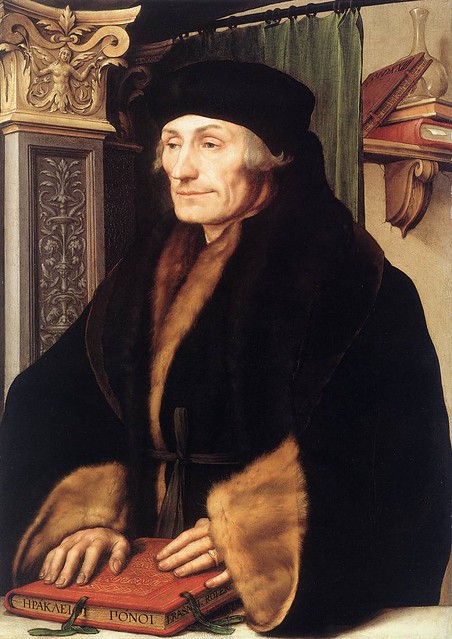The Middle Way of Erasmus

The Middle Way of Erasmus
Brian Zahnd
Ever since becoming familiar with the Renaissance theologian and Christian humanist Erasmus of Rotterdam (1466–1536) some ten or twelve years ago, I have often wished that Erasmus could have won the day during the theological tumults of the 16th century. By which I mean, I wish that the Renaissance-era Church in the West could have experienced reform without the divorce and subsequent Protestant fragmentation. (Recently I wrote some thoughts on the Reformation in a piece I called “Beyond the Wittenberg Door.”)
This month Ron Dart published a collection of essays on Erasmus under the title Erasmus: Wild Bird. Ron Dart is a Canadian professor, scholar, and theologian with considerable expertise in Church History, Patristics, George Grant, and Thomas Merton. Dart has written 35 books and is an accomplished mountaineer. He’s also a personal friend and there are few people for whom I have as much respect as I do Ron Dart. He is an inspiring example of a wise and contemplative academic.
In his latest book Dart asks, “What would the Christian Church be like today if the guidance and wisdom of Erasmus in the early 16th century had been followed rather than the reactionary Protestant thinking of Luther or Calvin or the equally brittle response of the Roman Catholic stance at the Treaty of Trent?” Throughout this collection of essays Dart makes these points about Erasmus:
1. Erasmus was probably the finest Bible translator and exegete of the 16th century.
2. As one of the best Patristic scholars of his age, Erasmus embodied what might be described as “radical conservatism” — radical in that Erasmus was a prophetic voice calling for deep reformation (to the degree that the Catholic Church put Erasmus’ writings on the Index of Forbidden Books until the 20th century), but conservative in his respect for received tradition and in his commitment to preserving the unity of the church.
3. Erasmus would never have been so reactionary as to set spirituality against religion, as many are prone to do in our reactionary and secular age.
4. Erasmus was a trenchant critic of war and especially of Christians fighting one another in the name of the Prince of Peace. The early Anabaptists were enormously influenced by Erasmus.
5. Erasmus lived during a time when Islamic militancy was on the rise. Most Christians responded with their own reactionary, hawkish militancy. Erasmus, reminiscent of St. Francis of Assisi, advocated the Christlike way of peace.
6. Erasmus threaded together a more mature and nuanced mystical theology — a way that was contemplative while rooted in the Bible and Church Fathers.
I think you can see how a study of the life and work of Erasmus of Rotterdam could be extremely relevant for today. And Ron Dart’s Erasmus: Wild Bird is an excellent place to start.
Recently when I remarked to a friend how I wished that Erasmus could have won the day, my friend replied, “perhaps he will yet.” That beautiful thought gives me hope.
BZ
(The artwork is Portrait of Erasmus of Rotterdam by Hans Holbein the Younger, 1523.)